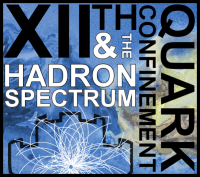Speaker
Description
The goal of the COMPASS experiment at CERN is to study the structure and dynamics of hadrons. The two-stage spectrometer used by the experiment has good acceptance and covers a wide kinematic range for charged as well as neutral particles allowing to access a wide range of reactions. Light mesons are studied with negative (mostly $\pi^-$) and positive ($p$, $\pi^+$) hadron beams with a momentum of 190 GeV/$c$.
The light-meson spectrum is measured in different final states produced in diffractive dissociation reactions with squared four-momentum transfer $t$ to the target between 0.1 and 1.0 (GeV/$c$)$^2$. The flagship channel is the $\pi^-\pi^+\pi^-$ final state, for which COMPASS has recorded the currently world’s largest data sample. These data not only allow to measure the properties of known resonances with high precision, but also to search for new states. Among these is a new axial-vector signal, the $a_1(1420)$, with unusual properties. The findings are confirmed by the analysis of the $\pi^-\pi^0\pi^0$ final state.
